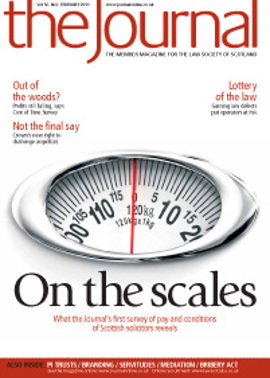Limits of authority

A great advantage of powers of attorney is the flexibility permitted to the drafter in crafting the attorney’s powers. There is no style or formula set down by law. This flexibility in drafting can be of particular use in reassuring an anxious granter that he or she can afford just enough responsibility to the attorney or attorneys as he or she is comfortable with. The lack of a set style or formula can, perhaps, lull the drafter into a false sense of security in that there are few restrictions on how the attorney can be empowered. However, it is suggested that the drafter must pay attention to the likely users or recipients of the power of attorney document and a key recipient will be the granter’s bank.
In the event that the attorney is required to act, the granter’s bank will almost certainly be a port of call. As a result, it almost goes without saying that it is critical that the drafting of the power of attorney is understandable to the bank and its staff. In this respect, clarity and precision is of the upmost importance. However, they are not the only considerations for drafters. It is suggested that the way that personal bank accounts operate and the way that a bank will approach a power of attorney must be taken into account.
It must be remembered that banks are not obliged to accept a power of attorney and if they are not convinced that the attorney is empowered to act, they will simply refuse to allow him or her access to the granter’s accounts. In the worst case scenario, the putative attorney may have to obtain an access to funds order, or even a guardianship order, to access the granter’s accounts. A few important considerations for drafters are set out below.
Spelled out
First, an issue that falls more comfortably within the general issue of clarity and precision but, nevertheless, is worth highlighting. The recipient of a power of attorney document at a bank will almost certainly not be legally qualified. At best the staff member will have some understanding that Scottish powers of attorney must be interpreted narrowly. Accordingly, the powers relating to the granter’s finances should be spelt out as clearly as possible.
For example, if the attorney is to be empowered to overdraw the granter’s accounts, this must be made clear. A failure to set out the ability to overdraw, or to make this clear enough, can cause difficulties if the granter’s account is overdrawn at the point the attorney wants to be able to operate it, as the bank can only assume that there is no permission to overdraw and may be unwilling to allow the attorney access to the account until the overdraft is paid off.
Acting together?
Where there is more than one attorney, careful attention should be paid to their ability to act individually or jointly. There are two points here.
The first takes us back to issues of clarity of drafting. Designing attorneys as “Mr A and Mrs B (‘my Attorney’)”, without any further clarification of their ability to act jointly or individually is fraught with difficulty, as it does not make it clear whether Mr A and Mrs B are to act jointly or are able to act individually. In such a situation, a bank could only conclude that the attorneys must act jointly.
The second point relates to the way that personal bank account mandates operate. The mandate will allow joint attorneys either to act individually, in which case either attorney can operate the bank account, or to act jointly, in which case both attorneys must sign for each transaction on the account. If a power of attorney empowers the joint attorneys to act in such a way that falls between these two options, such as “Mr A and Mrs B to act jointly except in case of emergency in which case Mr A or Mrs B may act individually”, the bank may refuse to accept the power of attorney or perhaps only permit the attorneys to act jointly. The bank will be unwilling to act as judge of what amounts to a “case of emergency”, or whether the attorney insisting that there is an emergency is telling the truth. Powers of attorney should be drafted to allow joint attorneys to act either individually or jointly.
It is suggested that it is also worthwhile explaining to the granter the practicalities of permitting his or her attorneys to act jointly or individually. If attorneys are required to act jointly, each withdrawal made, standing order set up or any other instruction must be provided to the branch in writing signed by both. Facilities such as telephone or internet banking will not be available. Clearly this would be of great importance if one attorney resides overseas.
Authority to overdraw
Placing financial limits on an attorney’s powers may cause anxiety for a bank. For example permitting the attorney only to overdraw to a limit of £1,000 is very difficult for a bank to enforce as, even if the arranged overdraft on the account is £1,000, there is always the possibility of unarranged borrowing, with the associated fees and interest. Tighter drafting to explain that the attorney is entitled to an arranged overdraft of £1,000 would be sufficient to ease any nerves on the bank’s part.
Joint accounts
One further issue relating to powers of attorney and banks does not concern advice for better drafting; rather it explains one point that good drafting cannot cure. Powers of attorney frequently entitle an attorney to “operate bank accounts including joint accounts”. However, banks will usually require the permission of the other joint account holder(s) to add the attorney to the account. This is often perceived by practitioners as banks being unnecessarily difficult, especially where a power of attorney entitles the attorney to operate joint bank accounts. However, in such situations the bank is operating in accordance with the law.
Joint accounts operate on an “either or survivor” mandate: as a matter of banking law, an “either or survivor” signing instruction on a joint account is an example of the operation of delegation by one joint account holder to the other joint account holder. The maxim delegatus non potest delegare applies to prohibit a delegate from delegating his delegated authority to a third party. As a result one joint account holder cannot delegate the power to operate the joint account to a third party. As such, where a power of attorney has been granted in respect of one joint account holder’s affairs only, the bank will request the express consent of the other joint account holder before adding the attorney to the joint account.
While this is not necessarily something that is to be considered when drafting a power of attorney (apart from the fact that drafting a power of attorney to allow the attorney to operate the granter’s joint accounts will not override the issue of delegation), it may be worth highlighting this to clients, especially in the situation where the client has a joint account with a party with whom they are not in regular contact.
It goes without saying that a well drafted power of attorney will smooth the path for an attorney negotiating the granter’s affairs and finances. It is hoped that a greater awareness of the approach of the banks to powers of attorney may enable drafters to ensure there are fewer bumps on the road.
In this issue
- Mutuality in action
- Tough choices
- Show us the files
- RoS launch business eZine
- Rewards of the job
- Pressure points
- Measure for measure
- Rage against the machine?
- Second bite at the cherry
- Personal injury trusts: benefits and PITfalls
- Countdown for Legal Aid Online
- Training: SYLA will play its part
- Law reform update
- Branding or bragging?
- The learning curve
- Ask Ash
- Mediating retirement
- CICA - a question of timing
- The evidence against
- Fought all the way
- Family friendly
- Stakes too high
- Much ado about plenty
- Limits of authority
- Scottish Solicitors' Discipline Tribunal
- Website review
- Book reviews
- Straight dealing
- Servitudes, developers and flexible rights






